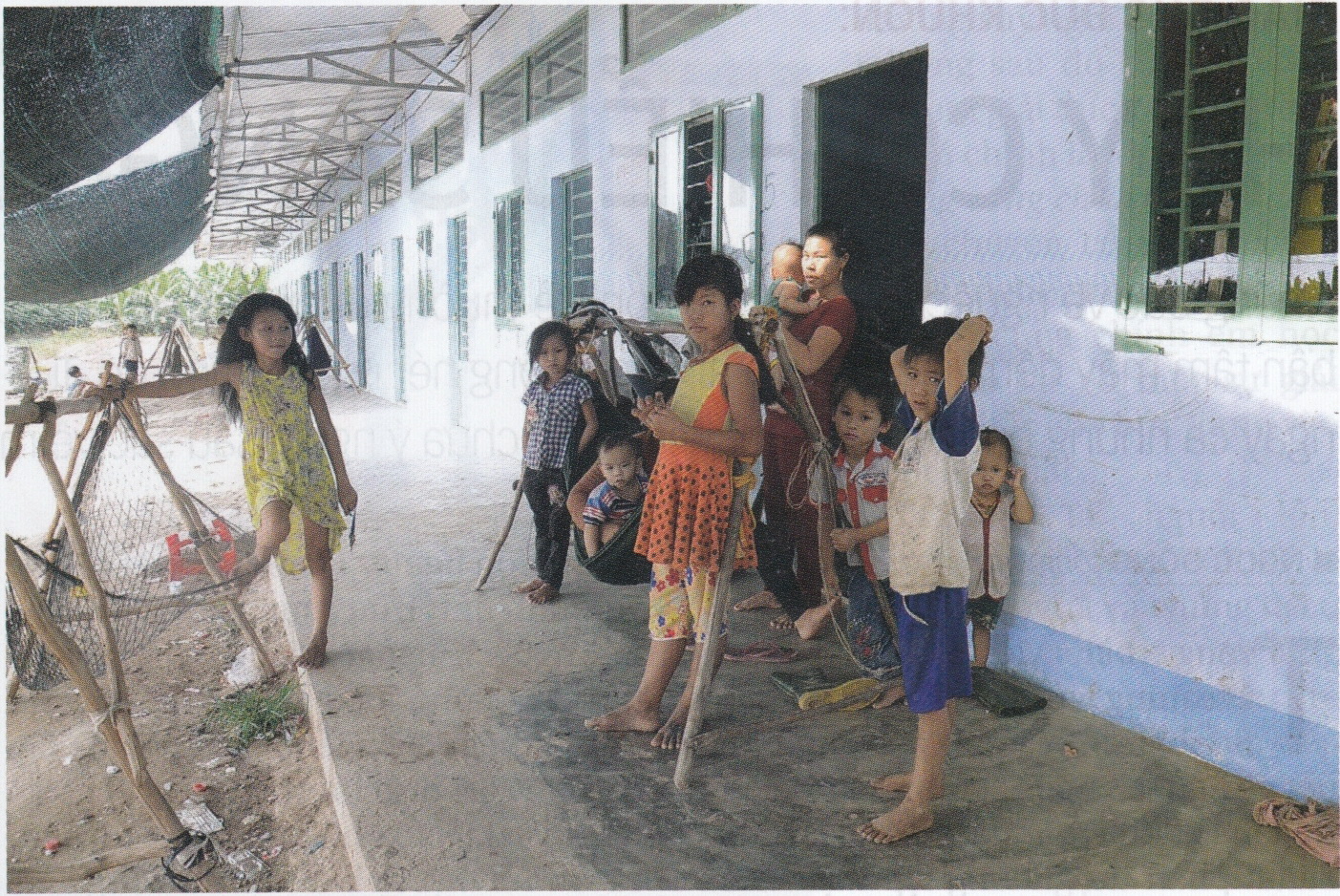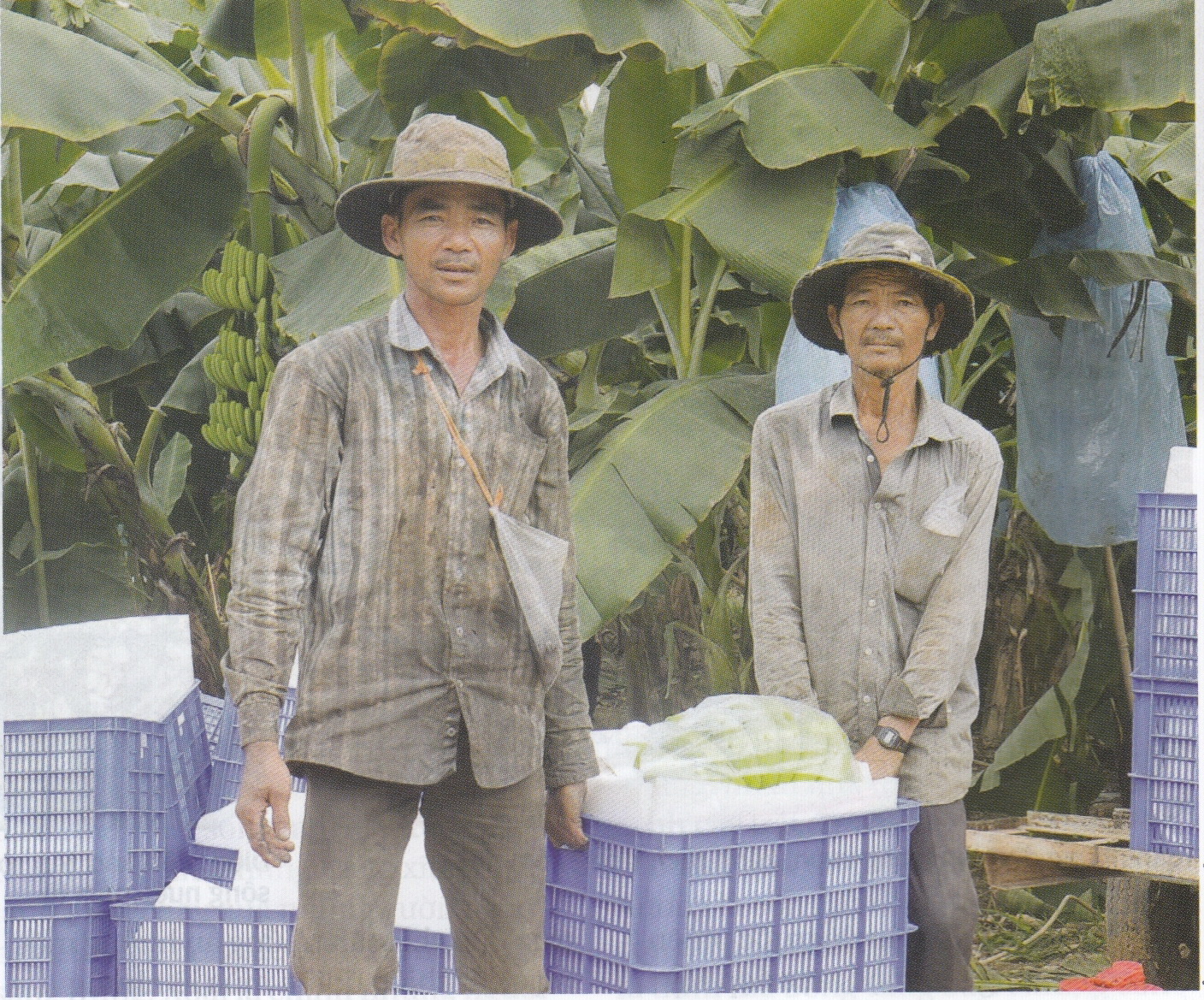Unlike numerous countrymen, Vietnamese returnees from Tonle Sap Lake in Cambodia are living a good life at a banana farm in the Mekong Delta province of Long An.
Around five generations of ‘overseas Vietnamese’ have been settling in floating homes along Tonle Sap, the largest freshwater lake in Southeast Asia, where they have eked out a living as fishermen.
However, once a prime breeding ground, fish have become exhausted in Tonle Sap in recent years, discouraging the migrant fishermen from continuing their lives on the lake.
Over the past 10 years, the emigrants have been returning to Vietnam in increasing numbers, setting up temporary homes along canals and rivers near the border.
Most have nothing but a boat and their fishing nets.
Long An Province hosts the most returnees, with over 1,700 individuals in 424 households, according to a 2013 count.
Over the past year, hundreds of these overseas Vietnamese have put down roots at the Food Huy Long An banana farm, owned by Vo Quan Huy.
At the plantation in Duc Hue District, the workers are provided with free housing, electricity, water, rice and a monthly salary.
This is in sharp contrast to the gloomy outlook for most returnees.
Putting down roots
Tran Van Duong and his younger brother, Tran Van Sieng, are busy cutting down bunches of bananas weighing over 10kg and separating them into individual ‘hands’ for harvest.
The duo load the harvested fruit onto a small truck which transports them to the factory for processing.
“We work in a group and earn over VND100,000 [US$4.4] per day each,” Duong said.
Over a year ago, just like thousands of their countrymen, the brothers were ‘stateless’ emigrants in Rach Vung Village in Kan Dieng District, Pursat Province, Cambodia.
They led a destitute life on the 15,000 square kilometer lake and held no citizenship.
Despite having lived there for decades, they failed to integrate into the local Cambodia community and had not become fluent in Khmer.
Poverty, a lack of access to education, and this failure to integrate have all forced them to return to their motherland.
Before making the huge decision to return his wife, four children, nieces and nephews, and five grandchildren, who would all cram into a shabby boat on Tonle Sap, back to Vietnam, Duong made several ‘reconnaissance’ trips.
The 50-year-old, however, was anxious about his family’s return.
“We would have to sell our boat to cover the trip. We were born fishermen, how would we earn our living in Vietnam once our boat was sold?” he said.
Upon learning of the favorable working conditions at Huy’s banana farm, Duong sold his boat and took his entire family there without further hesitation.
After working at the farm for two months, Duong phoned his brother, who immediately joined him with his wife and four children.
Hard-working laborers
The 180-hectare banana farm is currently home to two blocks of 60 ‘apartments,’ each equipped with a separate room, a wooden bed, a kitchen, an altar and full access to water and electricity.
The ‘apartments,’ embellished with richly-colored ribbons, brim with young children, and are typical of communities of Tonle Sap returnees.
 |
| Kids frolic outside a block of workers' houses at the farm. Photo: Tuoi Tre |
“Two or three families arrange one adult to stay home and keep a watch on the children; otherwise there’s a chance they’d get lost on the immense ranch,” Huy, the farm’s owner, said.
Huy’s place is currently ‘home-sweet-home’ for 47 households with a total of over 100 members, including more than 60 farm hands, he added.
Male and female laborers were also entitled to a 20kg and 15kg bag of rice each month.
There were always enough jobs for the residents, ranging from plowing soil, draining ditches, tending to harvesting, processing and packaging, Huy assured.
One year ago, upon learning of the influx of ‘stateless,’ jobless returnees from Cambodia, the entrepreneur embarked on the construction of one of his two ‘apartment’ blocks before recruiting workers from one of the ‘hot spots.’
“These returnees work really hard and are good at laboring. Everyone who is 16 years old or older will be assigned an appropriate job here,” Huy added.
One of the workers, Tran Thi Hien, revealed that she and her female colleagues were in charge of different phases at the factory, while their male counterparts typically worked on the farm.
“We are much better off now than we were at Tonle Sap,” Hien said, adding that she was tasked with picking standard fruits for packaging.
To Tuoi Tre (Youth) newspaper reporters’ surprise, the woman revealed that they had interviewed her a few years ago.
She was among the needy Vietnamese emigrants in Rach Vung Village, in Kan Dieng District, Pursat Province, Cambodia who were portrayed in a Tuoi Tre feature series in July 2013.
She, her husband and two babies, along with her extended family of over 30 members had crammed into a boat riddled with holes.
Tran Van Tai, or Ba Tai, Hien’s paternal grandfather, who was born on Tonle Sap and had lived there for over 60 years, was resolute that he would stay in Cambodia until he died.
Tai, along with many other returnees from Tonle Sap, was now a resident of Ta Do Village at the Dau Tieng Hydroelectric Reservoir, which spans parts of Binh Duong and neighboring provinces.
More than half of his family members were now at Huy’s banana farm.
“My father [Ba Tai] is getting frail now, but he is content that all his children and grandchildren now have stable jobs,” Tran Thi Mai, Tai’s daughter and Hien’s aunt, also a worker at the banana ranch, said.
|
Established in 2014, Vo Quan Huy’s banana farm boasts modern facilities and irrigation and logistics systems. In 2016, his business exported 3,500 metric tons of FOHLA trademarked bananas. “We are striving to expand our banana farm to 500 hectares and produce 80 metric tons of fruits per day in 2018. We want to be eligible to be an exporter to more fussy markets,” Huy said. “We will also need many more workers for the expansion,” he added. Huy is also planning to build a school on his farm to provide proper education for the workers’ children. “It’s hard for the returnees, whose numbers will increase in the years to come, to find stable jobs and accommodation like at Huy’s farm,” Pham Van Tran, secretary of Duc Hue District Party Committee, observed. “We are really supportive of the model, which benefits both the enterprise and workers. Upon the establishment of a school, Huy’s farm will be a perfect ‘home-sweet-home’ for the returnees and help improve their lives,” he noted. |
Like us on Facebook or follow us on Twitter to get the latest news about Vietnam!






















































